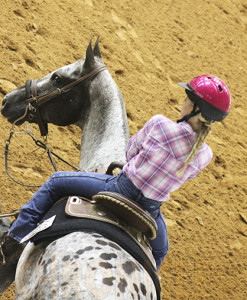ApHC Changes Horse Show Structure to Strengthen Regional Club/Affiliate Partnership
The Appaloosa Horse Club Board of Directors met in Moscow, Idaho, March 19‐21 and took action on a wide‐ranging set of proposals designed to place more emphasis on activities at the regional club and international affiliate levels. Acknowledging that some long‐standing rules and regulations have become restrictive, the board has, in effect, offered its own form of “de‐regulation” and provided more opportunities for local groups to determine the format of their shows.
A variety of other changes will encourage participation at all levels by adjusting Non‐Pro ownership rules and by creating high‐point champions in each territory.
“We are enthused about the outcome of work done by board members and staff to respond to obvious trend lines within the industry,” stated ApHC President Diane Rushing. “A great deal of effort went into developing more options for regional shows that will not only be more user‐friendly for Appaloosa members, but also be more inclusive and inviting for prospective members and participants across the industry.”
Specific adjustments to the show structure include the elimination of the rule that requires a minimum number of horses in order to be considered an approved, point‐earning show, if sponsored by a regional club. Regional clubs also are gaining a great deal of flexibility in terms of classes that are required for approval. In fact, regional clubs and affiliates may choose any classes from the list of approved classes and offer, for example a halter‐only show, an English show or any number of combinations – whichever classes will attract exhibitors in their particular part of the world. Beyond that, multiple breeds may be shown together in a class, with the stipulation that only the Appaloosas in the class will be counted for the awarding of national points.
Also of interest to regional club show organizers, is a new provision that allows clubs to make use of a “guest judge.” As an example, if a club hires two judges for a show, one of those judges could be someone from nearby who is carded with another breed or specialty association, thus saving considerable expense for travel. Some limitations will apply, but the intent is simply to reduce the financial impact of hosting a horse show.
In what can be considered a retro‐move, beginning with the next qualifying year, a regional club or international affiliate will be able to nominate its top nine horses in each class to the 2016 World Show. The traditional ApHC point scale will be increased for most classes, but is still in effect, so that horses can qualify through either the regional club or the national system. The regional club qualifying option is now also available to Non‐Pro’s. To further encourage participation at regional shows, horses and exhibitors can earn year‐end high‐point awards in their territory. And, in order to merit the overall high‐ point award in the nation, a horse or exhibitor must also have earned high‐point in a territory.
As explained by President Rushing, “These and other changes are designed to make things easier, not harder, for regional clubs and affiliates. Our focus has been on ways to increase participation at shows and in all ApHC activities at all levels, and to encourage more breeding and sales of Appaloosa horses…period.”
In the category of “shared responsibility,” regional clubs are being specifically charged with serving as breed ambassadors at the grass roots level to introduce the Appaloosa breed to the general population of horse lovers. In addition to the standard requirements for retaining a charter, clubs and affiliates will now be tasked with a to‐do list that includes at least two activities per year – sponsoring or co‐ sponsoring an ApHC‐approved show or trail ride, hosting a clinic, promoting the club and breed at an equine expo or similar event or other promotional/membership marketing activity that meets ApHC criteria.
More information about the rule changes is included in an outline presentation posted on the appaloosa.com website. Full text of the rule changes is also available on the site. Click on “About Us,” then “Board of Directors.”











